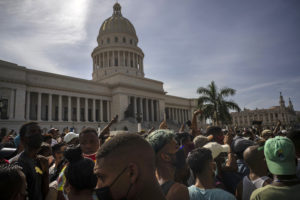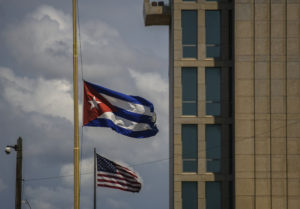By Geoff Thale and Clay Boggs
On February 21, the Boston Globe reported that senior State Department officials were considering removing Cuba from the list of State Sponsors of Terrorism. Advocates of engagement with Cuba welcomed this news, as de-listing Cuba would be a constructive step toward improving U.S.-Cuba relations. But the State Department responded quickly, stating that that the Department had “no current plans” to remove Cuba from the list. Whatever the actual state of discussions inside the administration, this is an opportune moment to reconsider Cuba’s inclusion on the terrorist list and to look again at the broader state of U.S.-Cuba relations.
In 1982, Cuba was added to the terrorist list on the grounds that the Cuban government supported armed revolution in the Americas. Although many who advocate for keeping Cuba on the terrorist list today admit that the original justification no longer makes sense, they allege that Cuba harbors Basque ETA members, Colombian FARC and ELN members, and U.S. fugitives from justice. That position is increasingly difficult to defend. In the past year, Cuba has played a constructive role in the peace talks between Colombia and the FARC that are being held in Havana. The United States has a strategic interest in the success of these talks, and the State Department has stated that it is "supportive" of the peace process. Cuba’s inclusion on the terrorist list at a time in which it is instrumental in brokering peace negotiations for one of the United States' closest allies makes U.S. foreign policy appear contradictory, if not incoherent.
More broadly, the U.S. approach toward Cuba, which is exemplified by Cuba’s designation as a State Sponsor of Terrorism, hurts the U.S. image in Latin America. In recent years, Latin American leaders have publicly questioned U.S. policy toward Cuba. At the most recent Summit of the Americas in Cartagena, Colombia, Latin American presidents across the political spectrum challenged President Obama on a number of issues, including Cuba’s participation in the Summit of the Americas and drug policy. It is also striking that Cuba is the pro tempore president of CELAC (Comunidad de Estados Latinoamericanos y Caribeños), the new regional forum that includes all of the countries of the hemisphere, except Canada and the United States. The changed geopolitical landscape—and the symbolic importance that U.S. policy toward Cuba continues to hold for the Latin American public and elite opinion—makes it clear that policy change toward Cuba would improve the U.S. image in the hemisphere.
Recent changes in Cuba itself strengthen the case for taking steps to improve this relationship. The United States has long conditioned changes in U.S. policy on changes in Cuba's political and economic system (WOLA has consistently argued that U.S. policy should change independently of changes in Cuba). But since 2011, we have seen a series of gradual but significant changes in Cuba's economic system, including the expansion of self-employment, the reduction in state payrolls, and liberalization in the agricultural system. Even as these economic changes took place, many doubted that Cuba would consider any changes in its political system. But in the past year Cuba has enacted long-awaited migration reforms, and Cuban President Raúl Castro has announced that he will retire in 2018, effectively putting an end date on the Castro era.
Cuba's changes are cautious: Raúl Castro's government is embracing neither free-market capitalism nor multi-party democracy. But the changes are real. Now is the moment when the Obama administration should consider taking some cautious steps of its own; taking Cuba off the terrorist list would be a common sense step that would acknowledge changes in Cuba and serve U.S. interests in the hemisphere.
Geoff Thale is WOLA’s Program Director. Mr. Thale has studied Cuba issues since the mid-1990s and traveled to Cuba more than a dozen times, including organizing delegations of academics and members of Congress.


